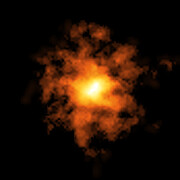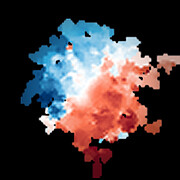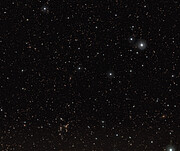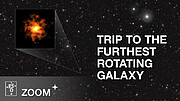Pressmeddelande
Mest avlägsna galaxen med roterande skiva funnen
7 oktober 2024, Skurup
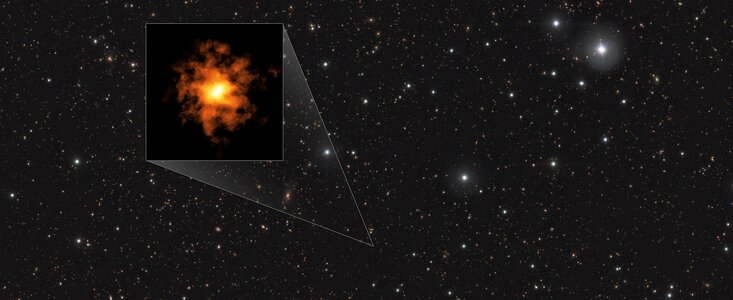
Astronomer har upptäckt den mest avlägsna Vintergatsliknande galaxen hittills. Galaxen, som har beteckningen REBELS-25, ser lika välordnad ut som dagens galaxer, trots att vi ser den vid en tidpunkt då universum bara var 700 miljoner år gammalt. Den välordnade strukturen är förvånande då unga galaxer enligt vår nuvarande förståelse borde vara mer kaotiska. Rotationen och strukturen hos REBELS-25 avslöjades med Atacama Large Millimeter/submillimeter Array (ALMA), där European Southern Observatory (ESO) är en partner.
De galaxer vi ser idag har utvecklats drastiskt jämfört med de kaotiska, oformliga motsvarigheter som astronomer vanligtvis observerar i det tidiga universum. "Enligt vår förståelse av galaxbildningen förväntar vi oss att de flesta tidiga galaxer är små och ser oordnade ut", säger Jacqueline Hodge, astronom vid Leiden University, Nederländerna, och medförfattare till studien.
Dessa oformliga, tidiga galaxer smälter så småningom samman med varandra och utvecklas till jämnare former i en otroligt långsam takt. Dagens teorier tyder på att en galax som är lika välordnad som vår egen Vintergata - en roterande skiva med välordnade strukturer som spiralarmar - måste ha utvecklats under flera miljarder års tid. Detektionen av REBELS-25 är därför en utmaning för denna tidsskala.
I studien, som har accepterats för publicering i Monthly Notices of the Royal Astronomical Society, fann astronomerna att REBELS-25 är den mest avlägsna och kraftigt roterande skivgalaxen som hittills har upptäckts. Det ljus som når oss från denna galax sändes ut när universum bara var 700 miljoner år gammalt – endast fem procent av universums nuvarande ålder (13,8 miljarder år) – varför REBELS-25:s ordnade rotation var helt oväntad. "Att se en galax med sådana likheter med vår egen Vintergata, som är starkt rotationsdominerad, utmanar vår förståelse av hur snabbt galaxerna i det tidiga universum utvecklades till de ordnade galaxer vi ser i dagens kosmos", säger Lucie Rowland som är doktorand vid Leidenuniversitet och huvudförfattare till studien.
REBELS-25 upptäcktes av samma forskargrupp under tidigare observationer med ALMA, som ligger i Chiles Atacamaöknen. Det var då en spännande upptäckt som indikerade att galaxen kunde rotera, men vinkelupplösningen var inte tillräckligt hög för att kunna dra säkra slutsatser. För att tydligt urskilja galaxens struktur och rörelser utförde forskarna uppföljningsobservationer med ALMA vid en högre upplösning, vilket bekräftade dess rekordartade karaktär. "ALMA är det enda existerande teleskopet med den känslighet och upplösning som krävs för att uppnå detta", säger Renske Smit, forskare vid Liverpool John Moores University i Storbritannien och medförfattare till studien.
Överraskande nog antyder även observationerna att galaxen har mer utvecklade egenskaper som liknar Vintergatans, som en central stav och spiralarmar, men fler observationer kommer att behövas för att bekräfta detta. "Att hitta ytterligare bevis på mer utvecklade strukturer skulle vara en spännande upptäckt, eftersom det skulle vara den mest avlägsna galaxen med sådana strukturer som observerats hittills", säger Rowland.
I kombination med andra upptäckter av tidiga roterande galaxer kan framtida observationer av REBELS-25 potentiellt förändra vår förståelse av den tidiga galaxbildningen och utvecklingen av universum som helhet.
Mer information
Forskningsresultaten presenteras i artikeln “REBELS-25: Discovery of a dynamically cold disc galaxy at z=7.31” som publiceras i tidskriften Monthly Notices of the Royal Astronomical Society.
Observationerna genomfördes inom ramen för ALMA Large Program REBELS: Reionization Era Bright Emission Lines Survey.
Forskarlaget utgörs av L. E. Rowland (Leiden Observatory, Leiden University, Nederländerna [Leiden]), J. Hodge (Leiden), R. Bouwens (Leiden), P. M. Piña (Leiden), A. Hygate (Leiden), H. Algera (Astrophysical Science Center, Hiroshima University, Japan [HASC]; National Astronomical Observatory of Japan, Japan), M. Aravena (Núcleo de Astronomía, Facultad de Ingeniería y Ciencias, Universidad Diego Portales, Chile), R. Bowler (Jodrell Bank Centre for Astrophysics, University of Manchester, Storbritannien), E. da Cunha (International Centre for Radio Astronomy Research, University of Western Australia, Australien; ARC Centre of Excellence for All Sky Astrophysics in 3 Dimensions), P. Dayal (Kapteyn Astronomical Institute, University of Groningen, Nederländerna), A. Ferrara (Scuola Normale Superiore, Italien [SNS]), T. Herard-Demanche (Leiden), H. Inami (HASC), I. van Leeuwen (Leiden), I. de Looze (Sterrenkundig Observatorium, Ghent University, Belgien), P. Oesch (Department of Astronomy, University of Geneva, Schweiz; Cosmic Dawn Center, Danmark), A. Pallottini (SNS), S. Phillips (Astrophysics Research Institute, Liverpool John Moores University, Storbritannien [LJMU]), M. Rybak (Faculty of Electrical Engineering, Delft University of Technology, Nederländerna; Leiden; Netherlands Institute for Space Research, Nederländerna), S. Schouws (Leiden), R. Smit (LJMU), L. Sommovigo (Center for Computational Astrophysics, Flatiron Institute, USA), M. Stefanon (Departament d’Astronomia i Astrofísica, Universitat de València, Spanien; Grupo de Astrofísica Extragaláctica y Cosmología, Universitat de València, Spanien), P. van der Werf (Leiden).
Atacama Large Millimeter/submillimeter Array (ALMA) är en internationell astronomisk anläggning som drivs i partnerskap mellan ESO, National Science Foundation (NSF, USA) och National Institutes of Natural Sciences (NINS, Japan), tillsammans med Chile. ALMA finansieras av ESO genom dess medlemsstater, av NSF i samarbete med National Research Council of Canada (NRC) och National Science and Technology Council (NSTC) i Taiwan, och av NINS i samarbete med Academia Sinica (AS) i Taiwan och Korea Astronomy and Space Science Institute (KASI). Konstruktionen och driften av ALMA leds av ESO för dess medlemsstater, av National Radio Astronomy Observatory (NRAO) genom Associated Universities, Inc. (AUI) för Nordamerika, och av National Astronomical Observatory of Japan (NAOJ) för Östasien. Joint ALMA Observatory (JAO) står för övergripande ledning och organisation under konstruktionen, driftsättningen och driften av ALMA.
Europeiska sydobservatoriet (ESO) möjliggör för astronomer världen över att utforska universums mysterier. Vi designar, konstruerar och driver markbaserade observatorier av yppersta världsklass – som astronomer använder för att besvara spännande och utmanande frågor och för att sprida astronomisk kunskap – och driver internationella samarbeten inom astronomin. ESO startade som en mellanstatlig organisation 1962 och har i dag 16 medlemsländer (Belgien, Danmark, Finland, Frankrike, Irland, Italien, Nederländerna, Polen, Portugal, Schweiz, Spanien, Storbritannien, Sverige, Tjeckien, Tyskland och Österrike), tillsammans med Chile som värdland och Australien som en strategisk partner. ESO:s högkvarter och besökscenter med planetarium, ESO Supernova, ligger nära München i Tyskland, medan teleskopen är placerade i Atacamaöknen i Chile, en unik plats för astronomiska observationer. ESO driver tre observatorier i Chile: La Silla, Paranal och Chajnantor. Vid Paranal finns Very Large Telescope och Very Large Telescope Interferometer, liksom kartläggningsteleskop som VISTA. Vid Paranal kommer även ESO att placera och driva Cherenkov Telescope Array South, världens största och känsligaste gammastrålningsteleskop. Tillsammans med internationella partners driver ESO de två anläggningarna APEX och ALMA på Chajnantorplatån som observerar himlen i millimeter- och submillimetervåglängder. Vid Cerro Armazones, nära Paranal, bygger vi för närvarande ESO:s Extremely Large Telescope, ”världens största öga mot himlen”. Från kontoret i Santiago, Chile, stödjer vi verksamheten i landet och samverkar med det chilenska samhället och våra samarbetspartners.
Länkar
- Forskningsartikel
- Foton på ALMA
- För journalister: Prenumerera på pressmeddelanden under embargo på svenska
- För astronomer: Berätta om din forskning!
Kontakter
Lucie Rowland
Leiden Observatory, University of Leiden
Leiden, The Netherlands
Tel: +31 71 527 2727
E-post: lrowland@strw.leidenuniv.nl
Jacqueline Hodge
Leiden Observatory, University of Leiden
Leiden, The Netherlands
Tel: +31 71 527 8450
E-post: hodge@strw.leidenuniv.nl
Renske Smit
Astrophysics Research Institute, Liverpool John Moores University
Liverpool, UK
Tel: +44-151-231-2922
E-post: R.Smit@ljmu.ac.uk
Bárbara Ferreira
ESO Media Manager
Garching bei München, Germany
Tel: +49 89 3200 6670
Mobil: +49 151 241 664 00
E-post: press@eso.org
Johan Warell (Presskontakt för Sverige)
ESO:s nätverk för vetenskaplig kommunikation
Skurup, Sverige
Tel: +46-706-494731
E-post: eson-sweden@eso.org
Om pressmeddelandet
| Pressmeddelande nr: | eso2415sv |
| Namn: | REBELS-25 |
| Typ: | Early Universe : Galaxy |
| Facility: | Atacama Large Millimeter/submillimeter Array |
| Science data: | 2024MNRAS.535.2068R |
Our use of Cookies
We use cookies that are essential for accessing our websites and using our services. We also use cookies to analyse, measure and improve our websites’ performance, to enable content sharing via social media and to display media content hosted on third-party platforms.
ESO Cookies Policy
The European Organisation for Astronomical Research in the Southern Hemisphere (ESO) is the pre-eminent intergovernmental science and technology organisation in astronomy. It carries out an ambitious programme focused on the design, construction and operation of powerful ground-based observing facilities for astronomy.
This Cookies Policy is intended to provide clarity by outlining the cookies used on the ESO public websites, their functions, the options you have for controlling them, and the ways you can contact us for additional details.
What are cookies?
Cookies are small pieces of data stored on your device by websites you visit. They serve various purposes, such as remembering login credentials and preferences and enhance your browsing experience.
Categories of cookies we use
Essential cookies (always active): These cookies are strictly necessary for the proper functioning of our website. Without these cookies, the website cannot operate correctly, and certain services, such as logging in or accessing secure areas, may not be available; because they are essential for the website’s operation, they cannot be disabled.
Functional Cookies: These cookies enhance your browsing experience by enabling additional features and personalization, such as remembering your preferences and settings. While not strictly necessary for the website to function, they improve usability and convenience; these cookies are only placed if you provide your consent.
Analytics cookies: These cookies collect information about how visitors interact with our website, such as which pages are visited most often and how users navigate the site. This data helps us improve website performance, optimize content, and enhance the user experience; these cookies are only placed if you provide your consent. We use the following analytics cookies.
Matomo Cookies:
This website uses Matomo (formerly Piwik), an open source software which enables the statistical analysis of website visits. Matomo uses cookies (text files) which are saved on your computer and which allow us to analyze how you use our website. The website user information generated by the cookies will only be saved on the servers of our IT Department. We use this information to analyze www.eso.org visits and to prepare reports on website activities. These data will not be disclosed to third parties.
On behalf of ESO, Matomo will use this information for the purpose of evaluating your use of the website, compiling reports on website activity and providing other services relating to website activity and internet usage.
Matomo cookies settings:
Additional Third-party cookies on ESO websites: some of our pages display content from external providers, e.g. YouTube.
Such third-party services are outside of ESO control and may, at any time, change their terms of service, use of cookies, etc.
YouTube: Some videos on the ESO website are embedded from ESO’s official YouTube channel. We have enabled YouTube’s privacy-enhanced mode, meaning that no cookies are set unless the user actively clicks on the video to play it. Additionally, in this mode, YouTube does not store any personally identifiable cookie data for embedded video playbacks. For more details, please refer to YouTube’s embedding videos information page.
Cookies can also be classified based on the following elements.
Regarding the domain, there are:
- First-party cookies, set by the website you are currently visiting. They are stored by the same domain that you are browsing and are used to enhance your experience on that site;
- Third-party cookies, set by a domain other than the one you are currently visiting.
As for their duration, cookies can be:
- Browser-session cookies, which are deleted when the user closes the browser;
- Stored cookies, which stay on the user's device for a predetermined period of time.
How to manage cookies
Cookie settings: You can modify your cookie choices for the ESO webpages at any time by clicking on the link Cookie settings at the bottom of any page.
In your browser: If you wish to delete cookies or instruct your browser to delete or block cookies by default, please visit the help pages of your browser:
Please be aware that if you delete or decline cookies, certain functionalities of our website may be not be available and your browsing experience may be affected.
You can set most browsers to prevent any cookies being placed on your device, but you may then have to manually adjust some preferences every time you visit a site/page. And some services and functionalities may not work properly at all (e.g. profile logging-in, shop check out).
Updates to the ESO Cookies Policy
The ESO Cookies Policy may be subject to future updates, which will be made available on this page.
Additional information
For any queries related to cookies, please contact: pdprATesoDOTorg.
As ESO public webpages are managed by our Department of Communication, your questions will be dealt with the support of the said Department.


